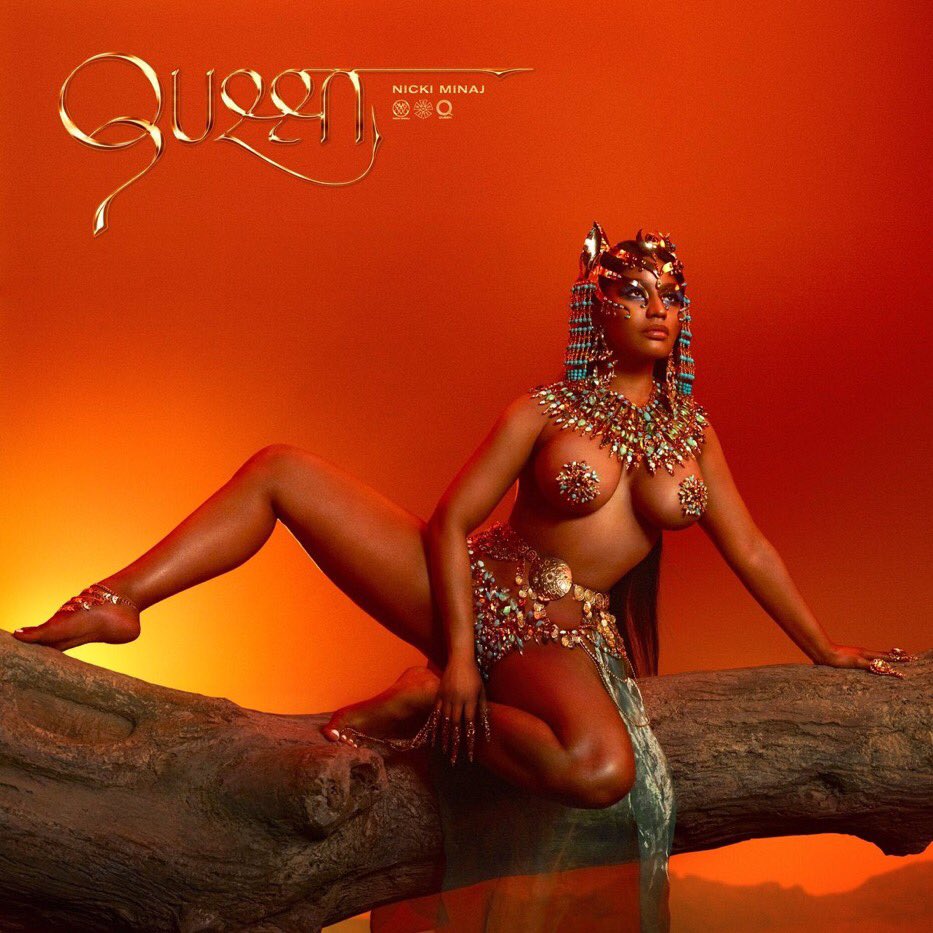Part of the experiment in considering Queen, Nicki Minaj‘s latest album and the follow-up to 2014’s The Pinkprint, is ignoring the five-month promotional cycle that preceded it. In announcing the album nearly half a year in advance, Minaj eschewed the music industry’s general contemporary preference for lead times of less than about two months. In an era where anything can be recorded, misconstrued, debated, or outright lied about, an extensive promo run that both calls attention to new music as well as to an artist’s own celebrity feels like a relic. In the last four or so years, beginning around The Pinkprint, the degree to which Nicki’s personal life has become personal fodder has only increased, thanks in large part to her break up with longtime boyfriend Safaree Samuels, who has boosted his own celebrity by airing their dirty laundry. Since, Nicki has been put in the middle of a beef between then-boyfriend Meek Mill and labelmate Drake, had to answer for her brother’s crimes, seen her relationship fail, and been drawn into beefs with other prominent female rappers, including the new hot artist on the scene. All of that, and Nicki’s own words online and in the press, have colored perceptions of her and her music throughout the run-up to Queen, complicating anticipation for what is a new album from a generation-defining artist.
There’s a reason Beyoncé has kept on doing surprise releases. It’s not just a cool thing to do, it’s also the easiest method of controlling the narrative. Her records, for instance, spin entire cycles of gossip stories, but only when, and how, she wants them to. Enough time spent thinking about a new album simply serves to create a narrative about what the album “needs” to be or “should” be, and whether or not a particular artist is waning in stardom. Justin Timberlake’s Man of The Woods, Taylor Swift’s Reputation and, most recently, Kanye West’s ye all suffered from this sort of fatigue. Nonetheless, it’s a particularly unenviable position for Nicki, both because of how much of Queen‘s promotional tour has become about gossip and conjecture and also because she never intended to promote the album this long in the first place. Queen has been subject to delays, a couple of disappointing singles (“Bed,” “Rich Sex”), and controversies regarding her comments about sex work and respectability, her working with Tekashi 6ix9ine, and bars at Cardi B. There was also the extremely unfortunate Twitter fight she got in with writer Wanna Thompson over a comment critiquing Nicki’s recent music. All of these little moments have chipped away at Queen‘s regality and, unfortunately, the album does very little to redeem Nicki.
For an album that was colored by tumult and chaos right up until the very end, Queen is shockingly dull. It follows the same roadmap as Minaj’s previous albums (there are the pop records, the trap records, the throwback New York rap records, and a few dancehall record for good measure), but it does so in lackluster manner. Except for standouts “Barbie Dreams,” “Good Form,” and “Chun-Li,” Queen is full of songs that Nicki has more or less done previously and in better ways. It’s not that Nicki has become a worse rapper (“Lara been Croft” jokes aside) or that the production is bad, it’s that everything here is only adequate—nothing pops, no chances are taken, and there isn’t any notable magic in these records. It’s just kind of a drag. Queen is an album that purports Nicki to be one of the greats in rap not by representing the best version of her artistry but instead simply via her explicit proclamations of such.
Throughout the album, Nicki is telling us, but mostly herself, that she’s still number one, whether through veiled disses at competing rappers (“Unlike a lot of these hoes whether wack or lit / At least I can say I wrote every rap I spit / Put my blood, sweat and tears in perfecting my craft / Still every team’s number one pick in the draft” on “Ganja Burn”) or her own ego inflation (“‘Cause they know I’m the queen, I still didn’t pick an heiress / Mirror, mirror, who’s the fairest?” on “Hard White”). These lines, especially the latter, stand out due to the inevitable (but sexist) idea that Cardi B is ascending to take her crown—as though women in rap are merely characters in Game of Thrones. It doesn’t help that Nicki herself seems to enjoy entertaining this narrative, telling interviewers how she laments the disappearance of rap beefs but also saying that she “would only be singing praises” about herself if she were a young female rapper coming up today. She leaves many of her disses so subliminal that you can’t help but try and decode them as you listen. It’s a good way to draw up excitement and intrigue around the music but hearing them throughout the album so many times is exhausting.
Queen also aims to be an “empowerment” album. In her interview with Elle, Nicki talked about how her music would be about affirming and valuing herself after going through a couple of bad relationships and encouraging her young listeners to do the same. There is some of that sprinkled throughout Queen, and it’s probably the closest to engaging the album comes: “He gotta be king status to get in ya body? / Fuck, yeah, ’cause a queen is what I embody” she raps on “Ganja Burn.” On “Miami”: “Too much money, I ain’t never need a sugar daddy / I’m the Belle of the ball, you could call me Patti.” These lyrics are nice but still don’t coalesce into much of a theme. The most frustrating aspect of Queen is that there doesn’t seem to be a point to any of it other than for Nicki to say she made a new album. She still seems to be in flux regarding what kind of direction to go in at this point in her career, though that isn’t totally her fault. Rap has changed dramatically since her last record, with a new wave passing by much of the current A-list, if not quite in numbers than certainly in cultural relevance. Nicki admitted as much when she retroactively added the 6ix9ine collaboration “FEFE” to Queen in order to push the album up the charts.
A cynical statement on the state of Nicki’s career, Queen looks to the past and has no grasp on anything present. Nicki Minaj is absolutely the royalty she has projected herself to be in rap, but there’s no proof of that here, nor does it make a case for that to continue.





